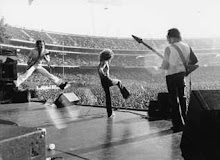Last night, over a bad, illegal download connection on my laptop (because I missed it live and couldn't wait for Hulu) I watched the "game-changing" episode of Dollhouse. I will admit, I wasn't expecting much. The eps so far have been alright, and that's giving it a bit too much credit. I've been hanging on to this show because I believe in The Joss Man and his vision, but slowly loosing hope. All doubt, though, left, when at three in the morning I ghasped my way through "Man on the Street."
Here's why: first of all, The Joss Man knows what viewers are thinking. He isn't trying to lead them along or hope they keep watching until the juicy scene or gimmicking his way through the show in order to keep viewers. He writes as if he is watching the show himself, and knows what we are thinking when we see it. This "third eye" enables him to play on our emotions at exactly the right moment. Ballard and Nellie are having another one of their "neighbor" conversations, as "just friends." He has his shirt off and I'm thinking, "He should just kiss her! That would be so cool!" and then SMACK he pulls her in and lays one on her. My jaw dropped! How often does television give you what you want, no build up, no explaination, just going for it? This is just one example of me, the viewer, having an urge to see something happen, knowing the writer woulnd never allow it, but I still want it, and The Joss Man being right there with me and going for it.
Another brutually amazing tactic The Joss Man uses is his dead-on ability to do exactly the opposite of what the viewer is thinking. He'll kindly lead me on in one direction, then crash everything to the point I am saying, "How are we going to get out of this? We can't fix this!" The Joss Man knows what the viewer is thinking and capitalizes on it by doing the exact opposite of what is expected. Nellie's about to be killed. I'm thinking, "They just had sex, therefore admitting they really do like each other, and there's no way she's going to survive this episode." I started tearing up. I LOVE Nellie! I'm thinking she's my favorite character, and now she's going to DIE! But at the last minute, when Ballard is running back to the house, calling on his cell phone, the message machine in the back of the struggle picks up and BOOM Nellie becomes a ninja. She's an ACTIVE? WHAAA? Brilliant. BRILLIANT. Of course, I say. Deus ex machina, without the cop out and confusion. It makes perfect sense. The Joss Man knows this. The Joss Man sees us coming, innocent and comfortable. The Joss Man isn't afraid to throw things at us, because he knows we can handle them. And we know he hasn't breached the Realm of Possibility. This is when really great writing happens. This is when a viewer can be shocked shocked SHOCKED! without being confused, dissapointed or blamful that the writer used "save yourself" writing.
The final note I will make on The Joss Man's writing is that he says things plainly. He doesn't go for flowery language. He doesn't attempt to say things in an elevated fashion or make characters sound more intelligent than they are. He writes the first words, the words people think before rephrasing them better. The truthfull words. This is why Buffy is fun to listen to. Even the quirky made-up words fit, because they are completely within the character's Realm of Speech. You can't see a writer feeding them words. Father Hesburgh once said something (in an article my grandfather read to my mother when she was little, so I don't have the exactly quote) about using the plainest words possible, because there's no need to use a word just because it is bigger. The Joss Man gets this. He says what needs to be said, not what "should be said on TV." The beauty of the quotes that come from his shows is in their cleanliness their precision. Its the principle of Shakespeare. It's funny because of how the words are said, how they have been moved around and how they have been joined together or ripped apart. In Shakespeare, everything is appropriate to the speaker, and nothing is ever our of place.
"You played a good hand."
"No, I played a very bad hand very well. There is a distinction."
Is The Joss Man Shakespeare? Not yet. But damn, it's good TV.
Saturday, March 21, 2009
Why Dollhouse "Man on the Street" Is Just Plain Good TV
Labels:
Dollhouse,
Father Hesburgh,
Shakespeare,
The Joss Man
Subscribe to:
Post Comments (Atom)

hah hah you'll keep watching, i have no doubt
ReplyDelete